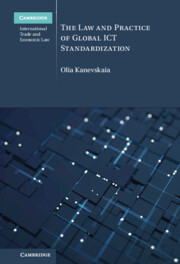Book contents
- The Law and Practice of Global ICT Standardization
- Cambridge International Trade and Economic Law
- The Law and Practice of Global ICT Standardization
- Copyright page
- Dedication
- Contents
- Tables
- Table of Cases
- Abbreviations
- Introduction
- Part I The Ecosystem of ICT Standardization
- Part II The Law of ICT Standardization
- 3 The WTO Regulatory Framework
- 4 The EU Regulatory Framework
- 5 The US Regulatory Framework
- 6 Procedural Principles for Standardization
- Part III Governance Architecture and Decision-Making Process of SDOs
- Part IV Due Process in ICT Standardization
- Annex I List of Interviews
- Bibliography
- Index
6 - Procedural Principles for Standardization
from Part II - The Law of ICT Standardization
Published online by Cambridge University Press: 09 February 2023
- The Law and Practice of Global ICT Standardization
- Cambridge International Trade and Economic Law
- The Law and Practice of Global ICT Standardization
- Copyright page
- Dedication
- Contents
- Tables
- Table of Cases
- Abbreviations
- Introduction
- Part I The Ecosystem of ICT Standardization
- Part II The Law of ICT Standardization
- 3 The WTO Regulatory Framework
- 4 The EU Regulatory Framework
- 5 The US Regulatory Framework
- 6 Procedural Principles for Standardization
- Part III Governance Architecture and Decision-Making Process of SDOs
- Part IV Due Process in ICT Standardization
- Annex I List of Interviews
- Bibliography
- Index
Summary
This chapter, while acknowledging that there are certain differences and similarities in how the law treats standards development organizations (SDOs) that develop voluntary standards, offers a holistic analysis of the procedural principles introduced in the WTO, EU, and US regulatory frameworks, namely, transparency, openness/participation, consensus, impartiality, balance, effectiveness, relevance, coherence, coordination, concerns of developing countries, appeal, and access to standards, which this study collectively refers to as “due process” principles. This chapter further explores the relevance and suitability of these principles to the different types of standards bodies and identifies the shortcomings of each of the legal mechanisms with regard to ICT standardization. It concludes that these principles are formulated rather flexible and, to be effective, need further concretization by SDOs.
- Type
- Chapter
- Information
- The Law and Practice of Global ICT Standardization , pp. 125 - 152Publisher: Cambridge University PressPrint publication year: 2023

